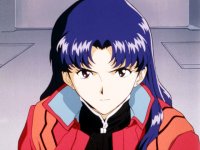 |
Analysis of Evangelion Characters
According to the Sephiroth Tree of Life |
Introduction
It is my strong belief that Neon Genesis Evangelion is strongly influenced by the Kabbalah and the Sephiroth Tree of Life.
Much has been written about the Kabbalistic symbolism in Evangelion, but I have found that Director Anno's messages run deeper than that. In fact, a closer analysis of the stages in the Tree of Life indicates that each main character in Evangelion parallels a single sephira. Each shows all the virtues, vices, illusions and obligations of their parallel sephira on the Tree of Life, and each either succeeds or fails to achieve fulfillment based on that sephira. Ultimately, Director Anno may be expressing his view of life through these impersonified sephiroth stages.
And it is my intention here to discover such connections. It may all be coincidences, but some of the observations outlined below are interesting, to say the least.
The reader is strongly urged to first read through this summary of the Sephiroth Tree and Colin Low's Notes on Kabbalah.
- Summary of the Ten Sephiroth
- Ikari Shinji
- Ayanami Rei
- Souryou Asuka Langley
- Ikari Gendo
- Katsuragi Misato
- Akagi Ritsuko
- Kaji Ryouji
- Others
Comments and suggestions are most welcome.
Summary of the Ten Sephiroth in the Tree of Life
| Sephira | Vice | Qlippah | Virtue | Vision | Illusion | Obligation | Command |
| Malkuth | Avarice (can't let go)/ Inertia | Stasis | Discrimination | Materialism | Discipline | Silent | |
| Yesod | Idleness / Sedation | Superficial / Robotism | Independence | Security | Trust | Go! | |
| Hod | Untruth | Rigidity | Truth | Splendor | Order | Learn | Will |
| Netzach | Selfishness | Habit | Selflessness | Beauty | Projection | Responsibility | Know |
| Tiphereth | Pride | Hollowness | Devotion | Harmony | False Identification | Integrity | Dare |
| Gerurah | Cruelty | Bureaucracy | Courage / Energy | Power | Invincibility | Courage / Loyalty | |
| Chesed | Tyranny, Bigotry, Hypocrisy, Gluttony | Ideology | Humility | Love | Self-Righteousness | Humility | |
| Binah | Avarice | Fatalism | Silence | Sorrow | Death | ||
| Chokmah | Evil | Arbitrariness | Good | Face-to-Face with God | Independence / Free-Will | ||
| Kether | Futility | Attainment | Union with God | Attainment |
* Source: Notes on Kabbalah by Colin Low.
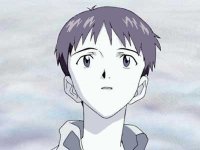
Shinji -- Yesod, the robot-incarnate
To many, Ikari Shinji is a simple wimp (or a complete wuss). He had no goal in life, knew nothing, had no courage, was totally naive, and merely got by in most situations. A deeper analysis will show that, however, Shinji is not as simple.
He is the impersonation of Yesod, with its illusion of security. For Shinji, this security actually lies in his heart as well as in his external environment. At the end of the TV show, Kaworu would expose this aspect of Shinji by accurately observing that "you [Shinji] are afraid of interactions with people for fear of being hurt. Therefore, you retract into the security of your own heart."
With Shinji, he lived in a constant illusion that it would be safe for him to hold back and hide from everybody and everything, into the security of his heart. Into an area protected by the heart's AT Field, as Kaworu would later point out. Externally, he would long to be in the security of his teacher's home as a small boy, doing nothing of significance and being safe. When this security (of body, of mind or of emotions) was lost, such as after being zapped by the giant blue grain of salt, he would react with fear more strongly than in any other incident.
Shinji depended on his security, and held on to this security throughout his life.
As a result, he showed all the signs of the vice of Yesod -- idleness whenever he can by doing nothing, being sedated at all times, having no clues what-so-ever about events happening around him. He was of course the last to realize that Touji was the Forth Children, the last to realize that Kaworu was the Seventeenth Angel, and the last to realize Gendo's treachery. He showed no signs of self-initiation almost throughout the show.
Whenever Shinji was forced to do something, he did so without any liveliness, always superficially, like a robot -- the qlippah of Yesod. Even in the early episodes this robotism was observed by Ritsuko. He was also constantly apologizing, and Asuka interpreted it as "a conditioned reflex to avoid being told off." In Episode 15, he even admitted that he did not stop doing something because nobody told him to stop, and Asuka replied a natural "Figures."
After a rare showing of self-initiative in an early episode, Shinji was told off by Misato, and apparently rightly so, for disobeying a direct order during combat. Shinji responded by escaping and running away, retreating to the security of his own, safe world. This constant need to seek security and, once found, to become sedated in it would underlie most of Shinji's character.
Therefore, it is not surprising that the command of Yesod is to "Go!" As in to move into action. Throughout the show Shinji struggled with himself, telling himself the same words over and over again: "I cannot run away (escape), cannot run away (escape)..." The three most dramatic episodes all showed Shinji finally taking action -- when battling the Third Angel, when refusing to kill EVA-03 because someone was inside, when threatening to destroy NERV headquarters, and when taking initiative to go back into EVA-01 once more to save NERV from the "folding-paper" Angel. All these are signs of Shinji breaking free from the chains of Yesod in a journey of self-fulfillment.
Nevertheless, his needs for (or illusion of) security persisted. When absorbed into EVA-01, into life's LCL -- certainly a very comfortable and safe and secured place -- he wouldn't want to leave. Ritsuko's question, "Don't you want to come back, Shinji?" would serve as a reminder to all that, once Shinji found security, it would be excessively difficult to pry him away again.
The obligation of Yesod is, not surprisingly, to "trust." Such is also the command made to Shinji by Kaworu at the bathing place: "You are afraid to trust for fear of betrayal. You prefer to stay in the security of your own closed heart." For Shinji, learning to trust others will be the final liberation from the negative aspects of Yesod; unfortunately though, at the very end, his feelings for Kaworu was betrayed once again. This was to accompany him all the way to the movies, until the very end when he wished for a secured world with only him and Asuka. He never found his independence, the virtue of Yesod.
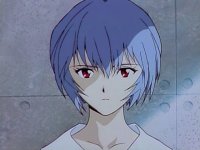
Rei -- Binah, the gloominess of death
Ayanami Rei is a riddle inside an enigma. She shows few emotions, causing others to conjecture whether she has them in the first place. Nevertheless, such mystery strikes a dark cord in people's hearts and she is nearly always at the top of popularity polls.
Asuka actually puts it very well in the EVA Additional Drama Track: "And that's what I can't figure out! She [Rei] has few appearances and fewer lines. She has the easy job of just standing in the corner of the frame and she gets all the votes. She's like a pull-string doll, she goes (imitating Rei's voice) 'Fine, do so' or 'Oh, that's nice' or 'Bye' AND THAT'S ALL SHE EVER SAYS!!"
However, when one searches deeply one finds a darker side to Rei's entire existence. Her connections with the theme of "death" is obvious: so much so that it tops the list in Ten Most Annoying Things in Evangelion: "Will Rei stop dying?? GOD we get the point!!!" and Asuka called her "gloominess personified" in the EVA Additional Drama Track. Rei's life(s) seem destined to be forever entwined with death or the possibility of death, and she seems to have an aura of darkness constantly surrounding her, which manifests externally as gloominess. This is probably the dark side of Rei that strikes so much a cord in all of us -- and does that mean that inside our hearts we are also touched by the darkness of death?
But ironically, Rei is not a person who fears death. In an early TV episode, Shinji showed how naive and immature he was by fearing to step into EVA-01 again: "You won't understand... you have not been through those horrible events." Even before the battle (with a giant blue grain of salt) Shinji constantly expressed his fears of death. Rei later would prove her worth by ignoring death in an in-your-face manner by voluntarily stepping into the path of the beam to protect Shinji. Such showing of courage dwarfs Shinji entirely, making him look like a small child. In the real world, we would interpret such courage as tremendous "inner strength," and that reflects Shinji's admiration of Rei: "You are so strong."
If one probes deeper into Rei's reasons for not fearing death, however, one does not find inner strength anywhere. She knew and made it very clear that she was strong because she "had nothing else" -- a statement that, of course, eluded Shinji's understanding. If she dies, "there will always be a replacement." (Ritsuko's mother said that when she strangled Rei I, and Rei said that herself when battling the "folding-paper" Angel). Therefore, it has no great significance whether she lives or not -- her death does not matter. It must have been a horrible life constantly living with the knowledge that if you die there will be replicants immediately available to replace you, and such darkness is the real reason behind Rei's skin-deep show of strength and courage when facing death.
One concept must then be made clear -- it is one thing to face death willingly because you are strong, and an entirely different thing altogether to face death because whether you life does not matter. Director Anno seems to emphasize this difference because it was later confirmed by Kensuke (one of Shinji's classmates) in Episode 14 that:
"...at that time [in Episode 6 against the giant blue grain of salt], EVA-00 protected EVA-01 with her life against the enemy's particle beam. ... it is due to a single reason -- Ayanami [Rei]. I have the impression that Ayanami [Rei] regards herself as having a very tenuous existence. But it cannot be described as pessimism -- she already has that in abundance."
The "it" that is not quite pessimism is that dark aura of death, almost a death-wish. Rei's life is filled with events that keep reinforcing this "does not matter" attitude. She never communicated with classmates because it didn't matter. Her body itself didn't matter (one cannot resist imagining what would have happened had Asuka been involved in the "will you move?" incident instead *chuckle*). Her life didn't matter. Death didn't matter. Being slapped in the face? Didn't matter. One actually sympathies with Rei who lived her life with such low self-worth.
Strangely, the only thing that ever mattered to Rei was Gendo's glasses, which actually served as a place-holder symbolizing her emotions for Gendo himself. In fact, only in front of Gendo did she ever show signs of a reduction in this "doesn't matter" attitude. The reasons behind her emotional bonds with Gendo can only be conjectured upon, but apparently it has to do with her having a piece of Yui's soul.
It then seems clear that Rei is an impersonation of Binah. One has only to realize that the illusion of Binah is death to understand that it must be true. Rei is constantly under this illusion of death, thinking that she has no self-worth and her life does not matter because it can always be replaced. Such thinking is exactly the qlippah of Binah -- "fatalism."
Consequently, Rei lived a life of sorrow, the vision of Binah -- when asked by Shinji why she pilots EVA, she answered "because of bonds." Those were the emotional bonds that caused such sorrow in her and around her from the very beginning of the show. She was constantly surrounded by an aura of darkness and gloominess due to this very vision of sorrow. Just before her final death, the Angel would say to her, "This is your mind, full of sorrow." It was an accurate description of her then-current situation.
The virtue of Binah is silence and Rei certainly has lots of it. Its vice, avarice, also accurately describes her personality because seldom did one see Rei doing something arbitrary, something out-of-the-blue or defying orders. Asuka constantly called her a "doll" and Rei even admitted that, if ordered to die, she would.
When she actually did defy orders, it was like a floodgate that opened. During the battle with the "figure-8" Angle, she finally realized that "I am I, not you." She realized her feelings for Shinji (and possibly due to her feelings for Gendo?). She defied orders and took matters into her own hands, sacrificing her life to save Shinji's. The moment before she died, she was in tears, signifying a complete liberation of her emotions.
This death of hers actually completed one milestone of her journal of self-discovery, of breaking through the restrictions and illusions of Binah to reach a higher goal. It was the first time that she voluntarily chose death because of her own reason, not because her life didn't matter. It was probably the first time that she had an idea of her "self" -- as evident from her discussion with the Angel Rei. It was the first time she disobeyed an order (thus breaking the vice of avarice) and did what she wanted to do. It was the first time she discovered herself as an individual and her own self-worth.
Her third incarnation, Rei III, would further this journey by acting independently -- something Rei never did in her entire life other than during the last moments. Rei III would play an important role in Kaworu's final scene, would break free from her imprisonment from feelings for Gendo, and would refuse to act as Gendo's doll in the movies.
Her journey of self-fulfillment had finally reached its end.

Asuka -- Tiphereth, the Capital "I"
Life is never dull around Souryou Asuka Langley (what a mouthful), the impersonation of Tipereth, the emptiness with no being but at the same time underlying all beings. One does not need to elaborate on the personality of Asuka, for doing so will be unnecessary -- she certainly made her personality clear enough for all to see. Furthermore, with an in-your-face attitude, she actually imposed her personality and view of life over all others around her.
Many people like Asuka for her exceptionally colorful character, inner strength, and willingness to speak-up and act independently. Her devotion to the Great Works (virtule of Tipereth) was evident -- "They [the Angles] attacked us, so they are our enemies. QED." However, it was her acting independent that caused her downfall in the very end of the TV episodes. She never had a single moment of doubt about who she was -- a genius, the greatest EVA pilot in the world.
Such false identity is the illusion of Tipereth that Asuka lived under. Because of this, she has plenty of Tipereth's vice to supply -- pride. It was pride that caused her downfall, but it was the qlippah of Tipereth, hollowness, that caused her ultimate destruction.
Inside Asuka's heart, covered and hidden by her brash and colorful attitude, was a hollowness similar to Shinji's and Rei's. This hollowness showed through early when she would kiss "just to kill time." Later she would start feeling troubled and disturbed when she did not have the full range of events happening around her to fill up her senses.
In the end, when the sugar coating of pride and identification was taken away (in the show's case, failure at battle), she found herself confronting this sinking hole of hollowness and started on the journey towards destruction: "Synchronization rate zero... Disqualified as an EVA pilot... I have no more reason to exist." Hollowness would later engulf her and bring her into a state of coma.
Not surprisingly, the obligation of Tipereth is integrity, which Asuka lacks due to her quick-fire temper and willingness to impose upon others. The command of Tipereth is dare, which actually personifies Asuka.
Ultimately, Asuka would fail to achieve Tipereth's vision: that of living in harmony, with others, with the world and with her own heart.
Would all of us self-confident, self-knowing humans be destined to follow Asuka's footsteps?
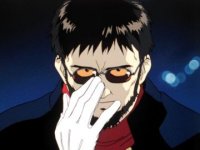
Gendo -- Chesed, what Man will do for love
To many, Ikari Gendo is a "Grade A Jerk." He constantly tops the polls on the most hateful Evangelion character.
This hate of Gendo is curious on the surface, especially due to the fact that he so loved Yui that all of what he did was to be with her. He loved Rei like a daughter (and some says a little more than that). He actually showed signs of compassion and emotions at times (not much).
Of course he also used everybody in sight, deceived everybody in sight, and betrayed everybody in sight for his own agenda: but the world is full of successful people doing the same thing and as such does not fully justify the extent of hatred he generates. In today's world, one would justify his actions by the ends he seeks, which is Yui. Should he not, then, be considered a tragic hero instead of Satan-incarnate?
In order to understand Gendo fully, one must dig into the sephira he impersonates -- Chesed. The vision of Chesed, of love, ironically was his one single driving force. In fact, even more ironically, Gendo was the only person in the entire show who had a strong sense of love, except for perhaps the love-hate relationship between Kaji and Misato, and the enigmatic affair between Ritsuko and him. Gendo's true love, of course, was Yui and everything he did started after Yui's disappearance. That such an apparently evil person was actually driven by love parallels the tragedy of Chesed.
Gendo lived constantly under the illusion of self-righteousness, that he was "right" to do what he did. It was obvious that he considered himself the only one knowing everything, and that his actions were all correct per se. If someone disagreed with his judgement, it could only be because he/she was wrong. Gendo is never wrong.
Such illusion breeds the vices of Chesed, the very dangerous combo of tyranny, bigotry, hypocrisy and gluttony -- his will was absolute, as in the use of the dummy plug against EVA-03 and the use of EVA-01 to rescue Rei; nobody should dare to challenge him, not even Ritsuko whom he would discard in a heartbest; his bigotry showed when he used the power and secret mission of SELLE to further his own agenda; his hypocrisy abound; and his gluttony showing through in his never being satisfied of the current state. Since Chesed can magnify all other vices through its emotional energy, so it magnifies hate in all of us when we view such a person. Such is the scariness of Chesed.
The qlippah of Chesed is ideology -- and it is this qlippah that Gendo works for-- the ideology behind human completion and being with Yui. Only until the very end did he finally discovered the virtue of Chesed -- that of humility -- when Rei III refused to be used as his doll in the movies. When confronted by Yui during the Third Impact, he would finally admit that "I am wrong. I have been wrong all these time."
Such is the tragedy of a person driven by love to extremes, discovering humility only too late.
Misato -- Netzach, the ultimate habit
Katsuragi Misato is easy to analyze -- she is the impersonation of Netzach. In fact, the single most distinctive thing about her throughout the show is her living habits: poor habits in fact. And habit is exactly the qlippah of Netzach, a danger that people will fall into once being in this state.
Her poor habits were reinfoced by her illusion of "projection", that is, imposing herself on others. One must ask whether she knew what other people thought about her being a complete slob, but one must also confront the answer that she simply didn't care, nor did she want to care. She liked curry in her instant Ramen, and so everybody else had to like the same thing. Throughout the show she imposed her likes and dislikes on others with total disregard about their feelings. Such power of projection (the illusion of Netzach) reinforced her bad habits into a vicious cycle. Any rational person having Misato as a roommate will label her "inconsiderate" -- i.e. projecting her bad habits to others.
Strangely enough, Shinji interpreted this as Misato willing to show him the true face of her. This is probably driven by Shinji's inherent mistrust of people.
This tendency to project reaches a climax during a late episode, right after Rei's sacrifice, when Misato tried to comfort Shinji without caring whether he wanted it or not. Soon later, she discovered that it was actually her who was lonely and wanted company -- she finally discovered her hidden feelings that she projected to others.
The virtues and vices of Netzach are also found abound in Misato. She was selfish all the way through (the vice of Netzach) and especially during early episodes. She admitted to wanting Shinji to live with her only because "I consider him a tool that I can use." She also wondered whether her devotion to NERV and its work was only because she wanted to avenge her father's death. "Don't make others suffer for your personal hatred," as this selfishness would come to a stand-off with Ritsuko in the episode of the "post-modernism painting" Angel.
The ideas of projection and selfishness are also summarized clearly in Episode 19 (almost unnecessarily):
Misato: ... to be honest, I have been projecting all my dreams, hopes and Purpose onto you. I know it has been a great burden to you, but we, everyone at NERV, have no choice but to entrust our future to you. Just remember that, please. Shinji: It is selfish, isn't it? Misato: I know that.
On the other hand, there are far too many incidents that we see Misato executing sacrifices in a totally selfless way -- the virtue of Netzach.
Ultimately, we see that Misato was driven by the vision of Netzach -- that of beauty. She understood that there were certain rights and wrongs in the world, and things that should and shouldn't be done. And this would ultimate drive her forward towards the obligation of Netzach (responsibility) and to the command of Netzach (to know the truth).
Responsibility is an obligation that Misato certainly found difficulties with. Sure, everybody in the show has responsibilities, and some very heavy responsibilities indeed. However, the show seems to constantly emphasize the domestic responsibilities that Misato faced (rather than her responsibilities to defeat the Angles, which were taken for granted in the show). More than once and throughout the show, Misanto was heard saying, "I am a poor guardian." Her responsibility was to Shinji and in this area she certainly failed miserably.
It was not until the very end, in the movies, that she fulfilled this ultimate responsibility in preparing Shinji for what he should do, including dragging Shinji out of his security-hole like a true guardian. When her responsibility was over, she died a peaceful death, knowing that she had done "done well" in the eyes of Kaji.
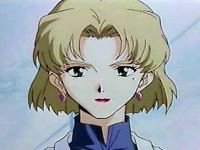
Ritsuko -- Hod, the ultimate illusion of order
Akagi Ritsuko is not a person liked by many -- she is constantly behind only Gendo in unpopularity polls. Perhaps this is due to her dark appearance and perhaps, like someone would point out, "anybody who wants to destroy Rei deserves to be hated."
Ultimately, however, Ritsuko was a tragedy. Not only was she stuck in a hopeless affair with Gendo, she was destined to repeat her mother's actions and mistakes almost verbatim -- even though she tried desperately to avoid being like her mother, to the extent of dying her hair.
Truth and untruth (lies), the virtue and vice of Hod, practically define her. Not only was Ritsuko intimately involved with the "truth" of NERV, EVA and the Human Completion Project, she was also intimately involved with propagating the numerous "untruths" and deceptions throughout the show. Ironically, truth and untruth also formed the foundation of her ultimate belief -- that of science which is based on logic, a system of exclusively truths and falsehoods. So much so, that she showed signs of rigidity, the qlippah of Hod.
Ritsuko's personal illusion is the illusion of Hod -- that there is a fundamental order in the world, and that this order can be described and understood neatly with science and logic. Her achievements as a distinguished scientist was the manifestation of this deep belief of hers, while she obediently following the obligation of Hod -- learning. This fundamental believe in science and logic, however, also caused her to constantly stumble upon issues that were not "logical," such as the feelings between a man and a woman.
At the end, Ritsuko would realize that the illusion of order and logic was what it was -- merely an illusion. She would realize that a "logical" computer would choose her lover over her, and that her relationship with Gendo was based on a pack of lies (untruths). But it was too late for her. She certainly did not achieve the vision of Hod, which is splendor, although she aspired to it: "I fear no insults on my own self when I have him in my mind, but to know that he considers these empty vessels more important than me -- is the ultimate insult." She constantly aspired the splendor of walking together with Gendo as lovers in human's most important project at human's most important moment.

Kaji -- Chokhmah, him of two faces
Kaji Ryouji is a lovable character -- funny, flirtatious, and righteous. Such is the observation of many.
Ironically, Kaji is also the single most independent character in the entire show, and the only character with actually a touch of evil. He worked for all sides and for no side; he was loyal to everybody and to nobody. In the end, he betrayed all.
Supreme independence -- the illusion of Chokhmah -- shows through in force in Kaji. Throughout the show he did whatever he wanted to, regardless of what others thought. His flirtatious and irresponsible actions dwarfed even those of Misato, and clearly showed the qlippah of Chokhmah to the full -- arbitrariness. His ultimate show of free-will, another illusion of Chokhmah, would serve to define his entire existence. He was obsessed with finding the truth and, in the process, was not afraid of acting independently and arbitrarily, even risking death. However, in the process he was also not afraid of lying to everybody and betraying everybody above and below him.
If one is asked, "Is Kaji good or evil?" it will be difficult to answer. Kaji worked only for himself, towards his own goals, and in this sense he was actually no better than Gendo. That his personal goals turned out to be to reveal the truth to Misato did not belittle this personal agenda of his and turn them into goodness. Had he found another goal in life, it is definite that Kaji would have been capable of immense evil.
In a nutshell, Kaji is a double agent, a person torn between the two faces of good and evil -- the vice and virtue of Chokhmah. Nevertheless, during his last moments, he would realize that his illusion of freedom and independence was just that -- an illusion -- as Ritsuko warned him before. On this, he might say, however, that death was the only freedom, to parallel Kaworu.
What about Malkuth, Kether and Gerurah?
Three sephiroth are not mapped to major characters. Is this merely a fact, or is there a conscious reason? We can only conjecture what kind of characters will have the personalities of these three sephiroth.
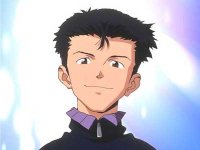 Gerurah GerurahSuch a person will live under the vision of "Power", and he will be deceived into believing he is more powerful than he actually is. In fact, he will be living under the illusion of invincibility, that he is too strong to be beaten. On one hand, such energy brings courage and loyalty, but on the other hand it also breeds cruelty, when he does not hesitate to use force to get what he wants, or take matter into his own hands. For certain times, such a person will be bureaucratic, constantly obsessed with the formalism of things. Do we see such a person in Evangelion? Can this be Touji? |
 Malkuth MalkuthThe Physical and Material World. Such a person will be the ultimate materialist, who only cares about material things and personal material gains. He will also have the intelligence to understand the trend and actions in events in the world, and he will be constantly voicing his own analysis of why things are. Of course, he is also a "if it ain't broke, don't fix it" type of person. Can this be Kensuke? |
 Kether KetherAs close to Godhead as it gets. Such a person will be the ultimate spiritualist, who only cares about attaining a "higher existence" and ignores the materialism of the world. However, he will struggle and fail time and time again, constantly realizing the futility of the act. Can this be Kaworu? |
See Also: Contemplation Guide to Evangelion Episodes
Revised by Aaron Clark

